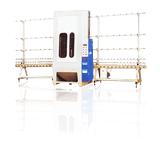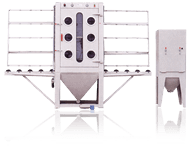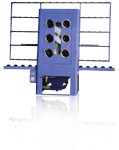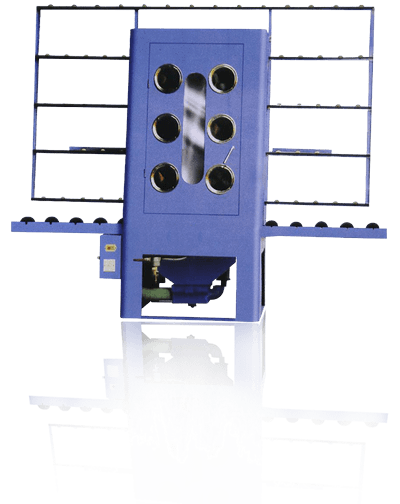Vertical Glass Sandblasting Machine
| Models |
SBM-V-A
 |
SBM-V-B |
SBM-V-C |
| Blasting Process |
Air Blasting |
Air Blasting |
Air Blasting |
| Dust Separating Process |
Bags Filter |
Cyclone |
Bags Filter |
- Highlights
- Description
- Specifications
Highlights
Budget Sandblasting Machine

- SBM-V-C glass sandblasting machines apply abrasives on glass surface while glass is placed vertically
- Air blast process with spray gun powered by compress air
- Work piece sandblasted inside well sealed blast cabin
- High efficient dust bags filtering & separating system
- Free of dust working environment
- Vertical design occupies less area
Description
General
The machine consists of several components.
- Blast Cabin
- Manually Controlled Blast Gun
- Abrasives Blasting System
- Abrasives Bags Filter Separating System
- Conveying System
Blast Cabin
It is a well closed chamber where sand blasting is taken place. Abrasive proof materials and surface treatments enables cabin durable and resistant to abrasives. There are gloves attached to holes on cabinet front where there are observation windows. Virgin or recycle abrasives are filled inside the cabin manually.
Manual Control Blast Gun
Machine comes with one manual control blast gun. Operator blasts the parts from the outside of the cabinet by placing his arms in gloves attached to glove holes on the cabinet, viewing the part through view windows and, manipulate spray gun manually.
Abrasive Blasting System
It is a siphon blast system, or sometimes known as suction blast system, using compressed air to create vacuum inside blast guns barrels. The negative pressure pulls abrasive into the blast gun via abrasive proof pipes. Compressed air directs the abrasives through blast nozzles impacting on glass. Abrasives are mixing with compress air during ejection, which fully utilizes compress air. Compress air quantity and abrasive amount are adjustable. Adequate mixing ratio minimizes abrasives and air consumptions.
Abrasive Bags Filter Separating System
It is a standalone structure. Dust separation is achieved by means of bags filtering. This process is a very high efficient way to capture reusable abrasive for recycling from disposal dust. During sand blasting, two types of contaminants are generated.
- a) Glass powder physically eroded from glass surface.
- b) Abrasives which become smaller in size or losing sharp edges after impacting on glass. These shattered abrasives are no more helpful for blasting.
Remaining abrasives are still large in sizes with sharp edges. They are reusable and are separated from dust by bags filtering system. Dusts are smaller and they pass through bags' tiny holes. Reusable abrasives are relatively larger in size and they are too large to pass through bags' tiny holes and finally they are collected in a box at the bottom of the separating system. When abrasive collecting box is full, recycle abrasives are brought back to blast cabin manually. Non-usable abrasive and dust are exhausted. They could be disposed in water drainage with plumbing provided by buyer or any other ways fulfilling local laws and regulations.
Conveying System
It consists of inlet, main and exit conveyors with idle rollers support. Main conveyor is inside blast cabinet. Glass is loaded on inlet conveyor and is passed into main conveyor manually. When sandblasting is completed, glass is moved onto exit conveyor manually.
Specifications
| Models |
SBM-V-C-1500 |
SBM-V-C-2000 |
| Max. Sandblast Height |
1500 mm |
2000 mm |
| Principle |
Air blasting process with blast nozzles powered by compress air |
| Virgin Abrasives Re-Filling |
Manually loaded in blast cabin |
| Dust Separation |
Bags Filtration |
| Re-Usable Abrasive Collection |
Automatically collected in box |
| Re-Usable Abrasives Recycling |
Manually brought from box to blast cabin |
| Dust Disposal |
Exhaust to water drainage or water precipitation or any other ways fulfilling local laws & regulations (plumbing & facilities to be provided by buyer) |
| Gun Operation |
Manual |
| Nr. of Automatic Gun |
Nil |
| Nr. of Manual Gun |
1 |
| Recommended Abrasive Grit |
#36 ~ #120 |
| Compress Air |
0.4 ~ 0.8 MPa |
| Voltage |
380V / 3 Phase / 50Hz |
| Power |
0.4 KW |
0.5 KW |
| Weight (kg) |
700 kg |
1000 kg |
| Outer Dimensions (L x H x W) |
1800 x 2500 x 1400 |
2100 x 3000 x 1400 mm |



